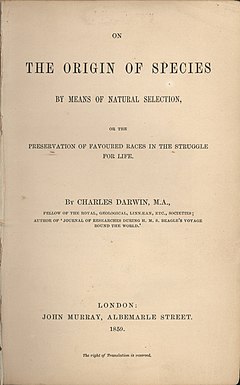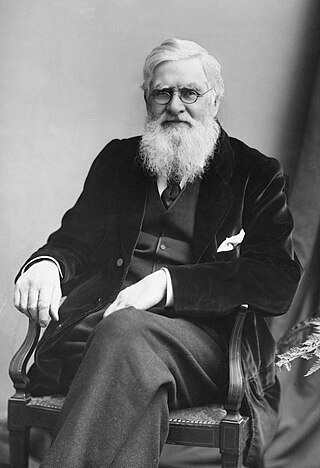
Alfred Russel Wallace was an English naturalist, explorer, geographer, anthropologist, biologist and illustrator. He independently conceived the theory of evolution through natural selection; his 1858 paper on the subject was published that year alongside extracts from Charles Darwin's earlier writings on the topic. It spurred Darwin to set aside the "big species book" he was drafting and quickly write an abstract of it, which was published in 1859 as On the Origin of Species.
Common descent is a concept in evolutionary biology applicable when one species is the ancestor of two or more species later in time. According to modern evolutionary biology, all living beings could be descendants of a unique ancestor commonly referred to as the last universal common ancestor (LUCA) of all life on Earth.

Creationism is the religious belief that nature, and aspects such as the universe, Earth, life, and humans, originated with supernatural acts of divine creation. In its broadest sense, creationism includes a continuum of religious views, which vary in their acceptance or rejection of scientific explanations such as evolution that describe the origin and development of natural phenomena.

Darwinism is a theory of biological evolution developed by the English naturalist Charles Darwin (1809–1882) and others, stating that all species of organisms arise and develop through the natural selection of small, inherited variations that increase the individual's ability to compete, survive, and reproduce. Also called Darwinian theory, it originally included the broad concepts of transmutation of species or of evolution which gained general scientific acceptance after Darwin published On the Origin of Species in 1859, including concepts which predated Darwin's theories. English biologist Thomas Henry Huxley coined the term Darwinism in April 1860.

Evolution is the change in the heritable characteristics of biological populations over successive generations. It occurs when evolutionary processes such as natural selection and genetic drift act on genetic variation, resulting in certain characteristics becoming more or less common within a population over successive generations. The process of evolution has given rise to biodiversity at every level of biological organisation.

On the Origin of Species is a work of scientific literature by Charles Darwin that is considered to be the foundation of evolutionary biology; it was published on 24 November 1859. Darwin's book introduced the scientific theory that populations evolve over the course of generations through a process of natural selection. The book presented a body of evidence that the diversity of life arose by common descent through a branching pattern of evolution. Darwin included evidence that he had collected on the Beagle expedition in the 1830s and his subsequent findings from research, correspondence, and experimentation.
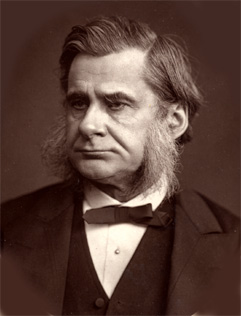
Thomas Henry Huxley was an English biologist and anthropologist who specialized in comparative anatomy. He has become known as "Darwin's Bulldog" for his advocacy of Charles Darwin's theory of evolution.
"On the Tendency of Species to form Varieties; and on the Perpetuation of Varieties and Species by Natural Means of Selection" is the title of a journal article, comprising and resulting from the joint presentation of two scientific papers to the Linnean Society of London on 1 July 1858: On The Tendency of Varieties to Depart Indefinitely from the Original Type by Alfred Russel Wallace and an Extract from an unpublished Work on Species from Charles Darwin's Essay of 1844. The article also includes an Abstract of a Letter from Darwin to Asa Gray, and an introductory letter by Joseph Dalton Hooker and Charles Lyell. The article was the first announcement of the Darwin–Wallace theory of evolution by natural selection; and appeared in print on 20 August 1858. The presentation of the papers spurred Darwin to write a condensed "abstract" of his "big book", Natural Selection. This was published in November 1859 as On the Origin of Species.
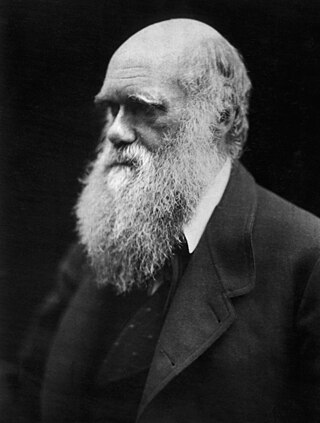
Darwin Day is a celebration to commemorate the birthday of Charles Darwin on 12 February 1809. The day is used to highlight Darwin's contributions to science and to promote science in general. Darwin Day is celebrated around the world.

Ray Comfort is a New Zealand-born Christian minister and evangelist who lives in the United States. Comfort started Living Waters Publications, as well as the ministry The Way of the Master, in Bellflower, California, and has written several books.

The publication of Darwin's theory brought into the open Charles Darwin's theory of evolution through natural selection, the culmination of more than twenty years of work.
The immediate reactions, from November 1859 to April 1861, to On the Origin of Species, the book in which Charles Darwin described evolution by natural selection, included international debate, though the heat of controversy was less than that over earlier works such as Vestiges of Creation. Darwin monitored the debate closely, cheering on Thomas Henry Huxley's battles with Richard Owen to remove clerical domination of the scientific establishment. While Darwin's illness kept him away from the public debates, he read eagerly about them and mustered support through correspondence.

Sir Edward Bagnall Poulton, FRS HFRSE FLS was a British evolutionary biologist, a lifelong advocate of natural selection through a period in which many scientists such as Reginald Punnett doubted its importance. He invented the term sympatric for evolution of species in the same place, and in his book The Colours of Animals (1890) was the first to recognise frequency-dependent selection. Poulton is also remembered for his pioneering work on animal coloration. He is credited with inventing the term aposematism for warning coloration, as well as for his experiments on 'protective coloration' (camouflage). Poulton became Hope Professor of Zoology at the University of Oxford in 1893.

Rejection of evolution by religious groups, sometimes called creation–evolution controversy, has a long history. In response to theories developed by scientists, some religious individuals and organizations question the legitimacy of scientific ideas that contradicted the young earth pseudoscientific interpretation of the creation account in Genesis.
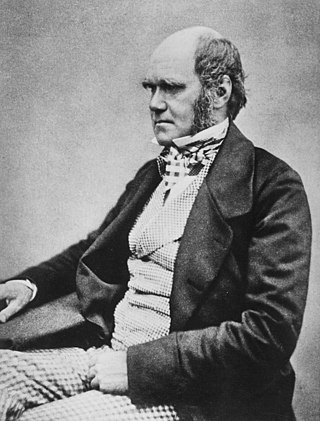
Charles Robert Darwin was an English naturalist, geologist and biologist, widely known for his contributions to evolutionary biology. His proposition that all species of life have descended from a common ancestor is now generally accepted and considered a fundamental concept in science. In a joint publication with Alfred Russel Wallace, he introduced his scientific theory that this branching pattern of evolution resulted from a process he called natural selection, in which the struggle for existence has a similar effect to the artificial selection involved in selective breeding. Darwin has been described as one of the most influential figures in human history and was honoured by burial in Westminster Abbey.

The 1860 Oxford evolution debate took place at the Oxford University Museum in Oxford, England, on 30 June 1860, seven months after the publication of Charles Darwin's On the Origin of Species. Several prominent British scientists and philosophers participated, including Thomas Henry Huxley, Bishop Samuel Wilberforce, Benjamin Brodie, Joseph Dalton Hooker and Robert FitzRoy.

The Darwin Centennial Celebration of 1959 was a worldwide celebration of the life and work of British naturalist Charles Darwin that marked the 150th anniversary of his birth, the 100th anniversary of the publication of On the Origin of Species, and the 125th anniversary of the second voyage of HMS Beagle. The major center of festivities and commemoration was the University of Chicago, which hosted a five-day event, organized by anthropologist Sol Tax, that attracted over 2,500 registered participants from across the world. According to historian V. Betty Smocovitis, the Chicago celebration "outshone-and arguably may still outshine-all other scientific celebrations in the recent history of science."
There are many known portraits of Charles Darwin. Darwin came from a wealthy family and became a well-known naturalist and author, and portraits were made of him in childhood, adulthood and old age. Darwin's life (1809–1882) spanned the development of photography, and early portraits of Darwin are drawn or painted, while many later portraits are monochrome photographs. After the publication and dissemination of the controversial On the Origin of Species in 1859, Darwin was also the subject of numerous caricatures.
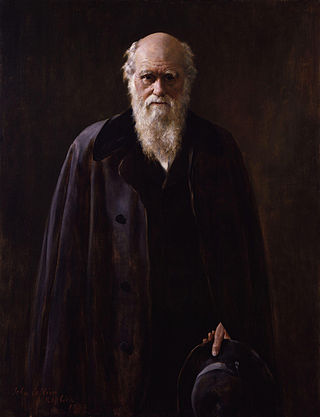
Commemoration of Charles Darwin began with geographical features named after Darwin while he was still on the Beagle survey voyage, continued after his return with the naming of species he had collected, and extended further with his increasing fame. Many geographical features, species and institutions bear his name. Interest in his work has led to scholarship and publications, nicknamed the Darwin Industry, and his life is remembered in fiction, film and TV productions as well as in numerous biographies. Darwin Day has become an annual event, and in 2009 there were worldwide celebrations to mark the bicentenary of Darwin's birth and the 150th anniversary of the publication of On the Origin of Species.

This bibliography of biology is a list of notable works, organized by subdiscipline, on the subject of biology.
